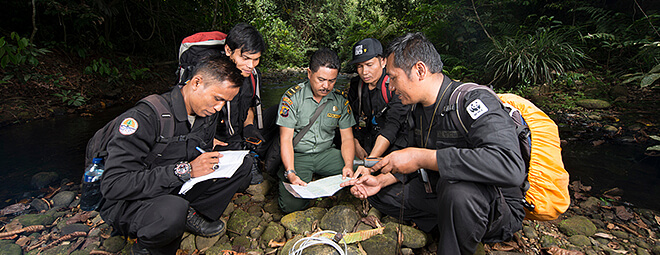WWF Japan Statement -Insufficient initiatives for the sustainability of the Tokyo 2020 Games-
2022/03/15
Unfortunately, the Tokyo Olympic and Paralympic Games, held amid an unprecedented COVID-19 pandemic, finished without sufficient "sustainability" initiatives indispensable for international sports competitions in the SDGs era.
In December 2021, after the Games, the report "Action & Legacy Report" was released. It describes the results of the Tokyo Games, including sustainability initiatives.
The Tokyo Olympic and Paralympic Games were to be held as "sustainable Games” that were environmentally and socially conscious. Its initiatives to decarbonize the Tokyo Games was a good one that deserve be considered as a good legacy for the following international events. However, "Procurement Code” set by the Organizing Committee of the Tokyo Olympic and Paralympic Games was carried out with lots of loopholes. The post-convention report, "Action & Legacy Report," which published the results, also left doubts about its transparency.
It is crucial to reflect what had been achieved and what remained as a significant challenge regarding the Tokyo Games' sustainability initiatives and how these findings will be utilized in the future. Since 2016, before the Tokyo Games, WWF Japan has been closely involved in the formulation, implementation, and evaluation of sustainability initiatives as one of the members of the "City Planning and Sustainability Committee" of the Tokyo Games. During the process, WWF Japan has released numerous proposals pointing out these issues.
The post-Olympic report "Action & Legacy Report" states that these procurement codes became inadequate because of the lack of consciousness towards the importance of the sustainability among Japanese society. From that perspective, the Organizing Committee states that its sustainability initiatives have played the role of raising the awareness of the importance of sustainability.
However, WWF has reiterated that it is a downfall to loosen the bar for sustainability initiatives because of the lack of consumer awareness. On the contrary, through showing procurement standards that can guarantee high sustainability, the awareness would be improved among the companies that procures products and goods. These should have influenced the consumers awareness too.
At the very least, it is indispensable to disclose the necessary information such as how much each company's initiatives progressed, how much sustainability was acquired, and also the data of how much certified products was used in the procured goods. Unfortunately, the post-convention report "Action & Legacy Report," as shown in the evaluation of each product below, was inadequate. Also, external review on operational performance, which is also indispensable was not conducted.
Based on the "Action & Legacy Report" and the "Post-Tournament Report (announced in December 2021)", WWF Japan reports our final evaluation on the problems of each Procurement Policies of the goods and its sustainable activities on the Tokyo Games.
Wood and paper
In addition to confirming legality, the principles of sustainability outlined in the "Sustainable Wood Procurement Standards" and "Sustainable Paper Procurement Standards" include conservation of local ecosystems, respecting the rights of indigenous peoples and local communities. It is considered to cover crucial points for ensuring sustainability and to go beyond legality confirmation.
On the other hand, the following two points unfortunately still remain as concerns.
While the basic principles cover the points for ensuring sustainability, there was a problem with the method of guaranteeing and confirming the principles. We have repeatedly pointed out the issue and offered proposals to the Organizing Committee before the Games. The timber and paper procurement standards do not require businesses to perform due diligence or require external audits, even for timber and paper that have not been certified by a third party. We believe that an appropriate auditing mechanism is essential to minimize the risk of uncertified wood and paper.
In addition, the contents of the "Action & Legacy Report" and "Post-Tournament Report" do not provide a transparent report on how the principles stipulated in the Sustainability Standards were secured. In the past London and Rio de Janeiro Olympic Games, in principle, the use of reliable internationally certified materials was required. However, it is still unclear how much the use of certified materials has progressed at the Tokyo Games, which also allows the use of non-certified materials. Furthermore, it has not been clarified what was done as the process of due diligence for non-certified products.
Palm oil
Page 38 of the "Action & Legacy Report” states that "transparency in the examination process was ensured regarding sustainability initiatives in the preparation and operation of the Tokyo Games. Diverse stakeholders including citizens participated, such as receiving suggestions and advice from experts, NGOs / NPOs, etc. with specialized knowledge.” However, it is very disappointing that the following two points, which WWF Japan has repeatedly proposed as crucial points, were not reflected at all.
● Procurement codes should set high goals that truly meet the global trend of sustainability. It is meaningless to reduce them to a feasible level when formulating the code in consideration of stakeholders. If the Organizing Committee wanted to consider small and medium-sized businesses, it should set up exceptional measures separately.
● It is essential to disclose information on the quantity procured for each certification scheme, the quantity procured for non-certified products, and the status of implementation of third-party verification, which should have been carried out in accordance with Procurement Standard 4, is being implemented when a procurement code is to be formulated.
Marine products
According to the post-convention report (P144), of the 39.3 tons of marine products provided at the Main Dining Hall, Fieldcast Break & Dining Club & Go, 37.2 tons were certified imported marine products. It is estimated that at least 94.7% of marine products were MSC or ASC certified.
It is appraisable that marine products that have acquired the international certification system were procured at a high rate in these places. On the other hand, the ratio of certified marine products was 75% in casual dining that offers domestic ingredients, which is not a low ratio. However, domestic certification systems, including the issues described below, are also included. The ratio for each certification system should have been disclosed so the achievement of the sustainability of the Tokyo Games could also be correctly evaluated.
On the other hand, as for the fact that if the procurement standard was a domestic certification system that is not recognized to satisfy FAO guidelines, or if there was a plan for resource management and/or fishing ground management, the fact that it was possible to provide the fishery without confirming and evaluating the actual situation and results was the result of announcing that Japan's perception of the sustainable fishery industry is far from the international perception.
Japan, which claims to be a major fishery nation, is responsible for driving the production and consumption of sustainable marine products not only in its own country but also in the world. It is extremely regrettable that the legacy of sustainable marine products, which has been passed down from the London Games to the Rio Games, has been set back.
In addition, the report (P98) states fairs utilizing certified marine products ingredients at government offices, etc., were held to further promote the spread of sustainable agriculture, livestock, and marine products as a legacy of the Games. However, government agencies should have taken the lead in building a system to provide them on a regular or regular basis, with the aim of increasing demand and awareness.
While there is a case that one Japanese company, which is also an official sponsor, encouraged a company that runs employee cafeterias to obtain CoC certification and not only started offering menus of MSC and ASC-certified marine products but also encouraged other companies to introduce them, it is hard to say that it is appropriate to describe it as an initiative result.
Circular economy and plastic pollution countermeasures
The report states that “thoroughly implemented the 3Rs (reduce, reuse, recycling) for goods procured by the Tokyo 2020 Organizing Committee for the Games” towards the realization of the legacy concept of “realizing sustainable resource use”. And the following initiatives are commended:
・ Furniture and fixtures were procured under a lease contract.
・ Used mobile phones and other small household appliances was collected for gathering metal materials to make about 5000 award medals for the Olympic and Paralympic Games.
・ Promoted Circular Economy by building podiums made with 24.5 tons of recycled plastics collected by citizens as well as collected from marine plastic debris.
However, the most important idea should be transforming from conventional mass production, mass consumption, and mass disposal system. It should be pointed out that, except for the procurement under leasing contracts, the Games not sufficiently incorporated the idea of designing out (design so as not to generate waste or pollution) that is the prerequisite for "reduce," the most prioritized concept in the 3Rs.
In the separately published "Sustainability Post-Games Report", there are also good examples, such as the utilization of reused tableware. However, the main focus was unfortunately "how to recycle the waste that has once been generated” rather than “designing out".
One of the other issues is the methodologies for the reporting. “Sustainability Post-Games Report” describes that during the operation, the 62% of the total amount of waste was reused or recycled. However, with this methodology, it is not possible to grasp the idea that how much resource input and waste generation were prevented by switching to designing out, reuse, or recycling. Even if a large amount of waste is produced as a result of mass production, it could give a misleading message that the level of sustainability has improved in case when the rate of recycling is higher.
In the report, the ratio of recycled plastics to the total amount of recycled contents is 7%. However, higher percentage does not mean increased level of sustainability, as this percentage goes up as the total amount of plastic waste increases. It cannot reflect the effect of reducing virgin plastic material input by promoting designing out, reuse, and using recycled materials.
As mentioned above, we evaluate that there was still room for improvement in "realization of sustainable resource use” considering that the insufficient application of designing-out by focusing on the recycling of waste that has once been generated and partially inappropriate disclosure on the reduction of raw materials. It is unfortunate that it could not be the successful model case of a circular economy aiming to eliminate marine plastic pollution, which is one of the serious global problems. It still relied on the concept of conventional mass production, mass consumption, and mass disposal system without clarifying proper priorities.
Decarbonization
Regarding decarbonization initiatives, the Organizing Committee aimed to be the world's most advanced Olympic and Paralympic Games to be held in the year of the implementation of the Paris Agreement in 2020. The name of the Working Group (WG), which discusses initiatives to tackle climate change, was "low carbon WG" when it was first established in 2015. However, it was renamed to "decarbonization WG" the following year after the adoption of the Paris Agreement at the end of the year.
The Organizing Committee set the Tokyo 2020 Games as the first Olympic and Paralympic Games with the goal of zero carbon, that is, "decarbonization.” After trying to save as much energy as possible, the Tokyo 2020 Games was run with 100% renewable energy. The remaining emissions were offset by offset credits based on strict international standards.
Furthermore, recycling was fully promoted including the iron recycling. As a developed country, Japanese cities are full with irons and metals which could be described as an urban mine. For the first time in Japan, it was recommended that recycled iron derived from electric furnaces would lead to a reduction in CO2 emissions. This was carried out despite a fierce opposition of a certain industries. This has led to change the perception of the climate activities in the Japanese society. This initiative could be a leading legacy of the Tokyo Games.
On the other hand, regarding the procurement policy for renewable energy, it was a rather half-finished effort, reflecting the current situation in Japan, where renewable energy is still developing. Originally, it was expected that the Tokyo 2020 Games would be a driver that would help Japan switch to 100% renewable energy not only for the electricity required for the tournament management but also for the electricity contracts at the existing venues. However, the switch to increasing renewable energy was only a small part partly because the implementing body is a joint body that straddles the national government, Tokyo, and surrounding local governments.
Nevertheless, as a whole, the Tokyo 2020 Games can be said that it played a leading role in Japan, where initiatives to decarbonize have been delayed.
Final remarks
The Tokyo Games was held in the same year as COP26 (the 26th Conference of the Parties to the United Nations Climate Change Framework Convention), which was also postponed to 2021 in Glasgow, England. It is epoch-making that the "Glasgow Leaders' Declaration on Forests and Land Use" (hereinafter referred to as the "Glasgow Declaration") was announced at an international conference on climate change, where forests and nature were taken up more than ever. It declares that more than 140 countries will work together to stop deforestation by 2030. However, with these sustainability initiatives accelerating, it is unfortunately hard to say that the sustainable procurement code presented by the Tokyo Games could have become a legacy suitable for an SDGs Olympics.
Sustainability initiatives are no longer just lip service. It is becoming inevitable as sustainable procurement becomes mainstream, especially in Europe. Sustainable procurement initiatives need to be accelerated in order to improve the international competitiveness of Japanese companies.
Internationally-focused events such as the Olympic and Paralympic Games must promote truly sustainable initiatives. It has the role of dramatically advancing the initiatives of the companies at the venue and promoting their dissemination throughout the world.
Future international events, including the Universal Exposition in Japan in 2025, cannot end up with half-hearted sustainability initiatives. We should build on the lessons learned from the Tokyo Games.







